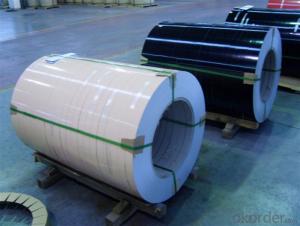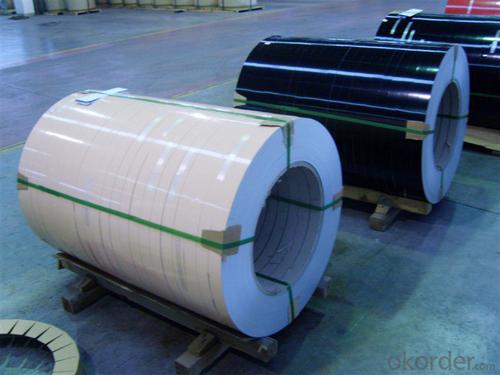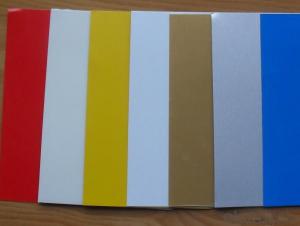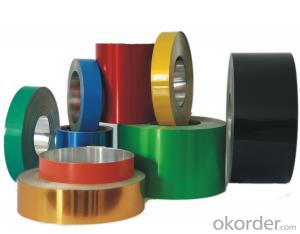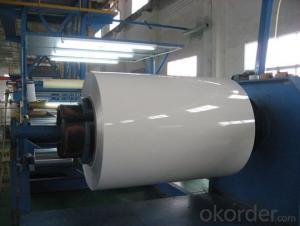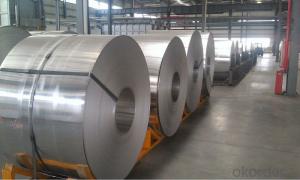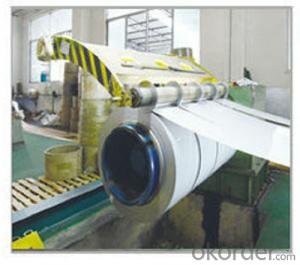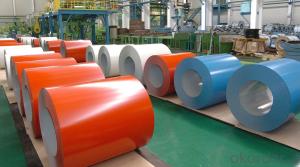RAL 8003 PE 18 Micros Coated Aluminum Coil Florida
- Loading Port:
- Shanghai
- Payment Terms:
- TT OR LC
- Min Order Qty:
- 2 m.t.
- Supply Capability:
- 50000 m.t./month
OKorder Service Pledge
OKorder Financial Service
You Might Also Like
Specification
Description
Standard | GB/T3190-2008, GB/T3880-2006, ASTM B209, JIS H4000-2006 .etc |
Thickness | 0.2-8.0 mm aluminium 7075 t6 |
Width | 1250mm 1000mm 1219mm or as your requirements |
MOQ | 2 Ton |
Package | Standard export package, by wooden box or as required. |
Application | 1060 is widely used in the strength requirements of the product. Products commonly used in signs, billboards, building exterior decoration, bus body, high factory wall decoration, kitchen sink, lamp, fan, electronic components, chemical apparatus, sheet processing, deep drawing or spinning hollow ware, welding parts, heat exchangers, Bell surface and plate, plates, kitchen utensils, accessories, safety equipment and other. |
Technical data
1060 aluminum Chemical composition | ||||||||
Al | V | Cu | Mg | Zn | Mn | Ti | Fe | |
99.6 | 0.05 | 0.05 | 0.03 | 0.05 | 0.03 | 0.03 | 0.35 | |
1060 aluminum Mechanical properties | ||||||||
Tensile strength(σb (MPa) | elongationδ10 (%) | |||||||
110-136 | 3%-5% | |||||||
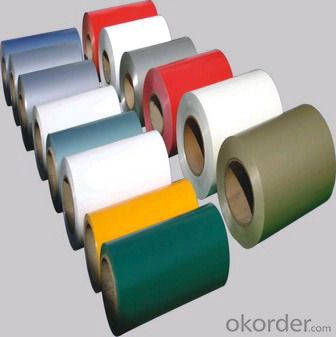
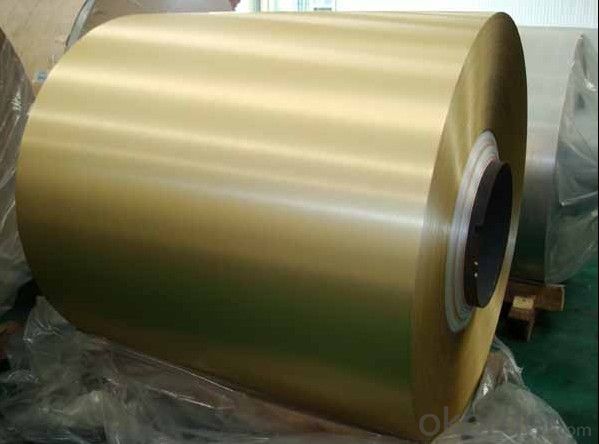
PE and PVDF Painting
Polyester Coatings (PE)
PE (polyester) coatings exhibit an excellent combination of hardness, flexibility, flow, appearance, and superior resistance to dirt retention in indoor and outdoor applications. These coatings are highly resistant to abrasion, metal marking, staining, and marring, and require minimal maintenance. Glazetech uses polyester paints which provide excellent colour and gloss retention properties.
Polyvinylidene Fluoride Coatings (PVDF)
PVDF (polyvinylidene fluoride) is a chemical resistant thick film barrier coating commonly used in architectural applications where both excellent appearance and substrate protection must be maintained over a long period of time. This coating is unaffected by most chemicals and solvents and has excellent wear and abrasion resistance. PVDF also has a high dielectric strength, excellent resistance to weathering and the ability to self extinguish.
- Q: I bought some drain opener as a source of sodium hydroxide and it has little silvery balls in it which I believe are aluminium. How can I separate the two substances with minimal loss of the sodium hydroxide? I don't care about the aluminium.
- Trust me. Its not worth salvaging the hydroxide. Aluminum hydroxide is unbelievably stable and that means you probably won't be able to salvage the hydroxide without doing electrolysis or something difficult like that. That's like trying to obtain hydroxide from methanol CH3OH. Oh yea you can make methanol quite easily from a halomethane by reacting it with a hydroxide of some kind. But you will not be able to remove that hydroxide at all without neutralizing it with an acid. Hydroxides are bloody awful leaving groups. That oxygen is really glued on to that carbon well. You have to really destabilize that methanol to remove that hydroxide. Same with the aluminum hydroxide. Very stable and strong bond.
- Q: Can aluminum coils be used for heat transfer applications?
- Yes, aluminum coils can be used for heat transfer applications. Aluminum is known for its excellent thermal conductivity, which means it is highly effective in transferring heat. Aluminum coils are commonly used in various heat transfer applications such as air conditioning systems, refrigeration units, and heat exchangers. The lightweight and corrosion-resistant properties of aluminum also make it a popular choice for these applications. Additionally, aluminum coils can be easily shaped and formed, allowing for efficient heat transfer in complex systems.
- Q: How are aluminum coils coated or finished?
- Aluminum coils are commonly coated or finished through processes such as painting, anodizing, or laminating. Painting involves applying a protective layer of paint or coating onto the aluminum surface to enhance its appearance and protect it from corrosion. Anodizing, on the other hand, involves creating a controlled oxide layer on the surface of the aluminum, which provides durability, improved color options, and resistance to corrosion. Laminating is another method where a protective film or layer is added to the aluminum coil, providing additional protection and improving its aesthetic appeal.
- Q: What are the potential applications of coil-painted aluminum coils?
- Coil-painted aluminum coils have a wide range of potential applications. They can be used in various industries such as construction, automotive, and electronics. In construction, they can be used for roofing, wall cladding, and insulation purposes due to their durability, corrosion resistance, and aesthetic appeal. In the automotive industry, coil-painted aluminum coils can be utilized for manufacturing car bodies, interior trim, and decorative elements. Additionally, these coils can be employed in the electronics sector for producing casings, heat sinks, and other components. Overall, the versatility and unique properties of coil-painted aluminum coils make them suitable for diverse applications across different sectors.
- Q: Why does the heat preservation aluminum roll bend when it is cooled?
- [insulation aluminum] is actually aluminum sheet, commonly known as aluminum coil. When delivered, it can be flat or curly.
- Q: Can aluminum coils be used for seamless gutters?
- Seamless gutters can indeed utilize aluminum coils. The reason aluminum is favored for gutter systems is its ability to withstand wear, its lightweight composition, and its resistance to rust. Aluminum coils are frequently employed in the construction of seamless gutters, which boast several advantages over the more traditional sectional gutters. Custom-made on-site, seamless gutters guarantee a flawless fit for the specific measurements of a structure. This eliminates the necessity for seams, which are susceptible to leaks and require regular maintenance. Moreover, aluminum is malleable, making it easy to shape seamless gutters to accommodate a building's unique design. In summary, aluminum coils present a practical and efficient option for the creation of seamless gutters.
- Q: Are aluminum coils suitable for automotive applications?
- Automotive applications can benefit from the suitability of aluminum coils. This lightweight material offers numerous advantages for automotive use. It possesses excellent thermal conductivity, enabling effective heat transfer and cooling in vehicles. Additionally, aluminum is corrosion-resistant, making it an ideal choice for automotive applications exposed to moisture and diverse weather conditions. Furthermore, aluminum coils possess a high strength-to-weight ratio, ensuring durability while maintaining a low vehicle weight. This aspect is particularly advantageous in enhancing fuel efficiency and reducing emissions. Moreover, aluminum coils can be easily molded and shaped into various automotive components, including heat exchangers, radiators, condensers, and evaporators. Their versatility and adaptability make them well-suited for a wide range of automotive applications.
- Q: What are the different coil handling equipment options for aluminum coils?
- There are several coil handling equipment options available for handling aluminum coils, depending on the specific requirements and preferences of the user. Some of the common options include: 1. Coil Lifters: Coil lifters are specially designed lifting devices that can safely and efficiently handle aluminum coils. They typically consist of a set of clamps or hooks that securely hold the coil and are attached to a lifting mechanism. Coil lifters can be manually operated or powered by electricity or hydraulics, providing ease of use and increased productivity. 2. Coil Tippers: Coil tippers are used to rotate or tilt aluminum coils to facilitate loading, unloading, or positioning. They are typically equipped with adjustable arms or clamps that hold the coil in place during rotation. Coil tippers can be controlled manually or using hydraulic or electric systems, allowing for precise and controlled movements. 3. Coil Cars: Coil cars are specially designed transport vehicles that are used to move aluminum coils within a manufacturing facility or between different areas. They are equipped with a platform or carriage on which the coil is placed, and can feature various mechanisms for loading, unloading, and positioning the coil. Coil cars can be manually operated or powered by electricity or hydraulics for increased efficiency. 4. Coil Turnstiles: Coil turnstiles are used to safely and efficiently store and retrieve aluminum coils in a vertical position. They typically consist of a rotating drum or spool that can hold multiple coils, allowing for easy access and retrieval. Coil turnstiles can be manually operated or powered by electricity or hydraulics, providing quick and convenient storage solutions. 5. Coil Cradles: Coil cradles are used to support and protect aluminum coils during storage or transportation. They typically consist of a sturdy frame or structure with adjustable arms or supports that securely hold the coil in place. Coil cradles can be customized to accommodate different coil sizes and weights, ensuring safe and stable handling. Overall, these coil handling equipment options provide various solutions for efficiently and safely handling aluminum coils, helping to streamline manufacturing processes and improve productivity. The choice of equipment would depend on factors such as the size and weight of the coils, the specific requirements of the operation, and the available budget.
- Q: Are aluminum coils suitable for insulation purposes?
- No, aluminum coils are not suitable for insulation purposes.
- Q: How are aluminum coils used in the production of battery enclosures?
- Aluminum coils are used in the production of battery enclosures as they provide a lightweight and durable material that can be easily molded and shaped to form the enclosure. The coils are typically processed and formed into specific shapes using a combination of heating, rolling, and cutting techniques. This allows for the creation of seamless and tightly sealed enclosures that can protect the batteries from external elements and provide efficient heat dissipation.
Send your message to us
RAL 8003 PE 18 Micros Coated Aluminum Coil Florida
- Loading Port:
- Shanghai
- Payment Terms:
- TT OR LC
- Min Order Qty:
- 2 m.t.
- Supply Capability:
- 50000 m.t./month
OKorder Service Pledge
OKorder Financial Service
Similar products
Hot products
Hot Searches
Related keywords
